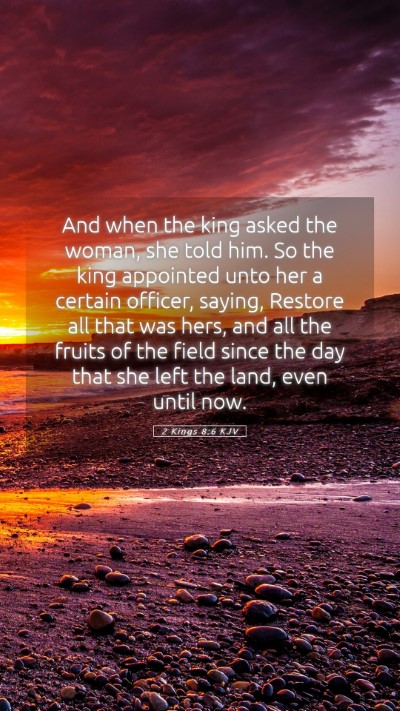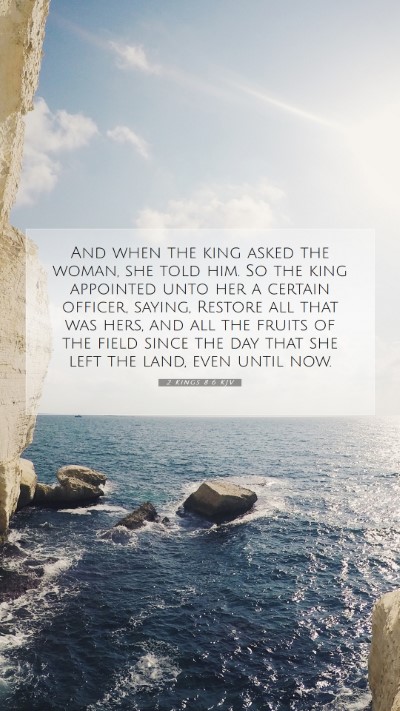2 Kings 8:6 - Understanding the Verse
Bible Verse: 2 Kings 8:6 states, "And when the king asked the woman, she told him. So the king appointed a certain officer for her, saying, 'Restore all that was hers, and all the proceeds of the field from the day that she left the land until now.'"
Insights from Public Domain Commentaries
This verse plays a pivotal role in understanding the intersection of divine providence and human governance, showcasing how God orchestrates circumstances for His people. Several renowned commentaries provide valuable insights into the meaning of this scripture.
Matthew Henry's Commentary
Matthew Henry emphasizes the faithfulness of God in rewarding the diligent and those who trust in Him. In this particular instance, he notes that the king's restoration of the woman’s land represents God's justice and mercy. Henry assesses that this act signifies not only the restoration of material possessions but also a reinstatement of the woman's dignity and status within her community. He highlights the importance of the king’s role as an instrument of divine providence, restoring that which was lost due to circumstances beyond the woman's control.
Albert Barnes' Notes
Albert Barnes draws attention to the context surrounding the woman's plight. He explains that her previous actions—leaving her land during a famine—were out of necessity and not indicative of a lack of faith. Barnes points out that this restoration serves as an encouragement to those who experience loss and depravity. He observes that it highlights the biblical principle of recovery and restoration under God’s governance, suggesting that God’s provision is ever-present, even in dire situations. He thus encourages readers to see this narrative as a microcosm of God's overarching plan for redemption and restoration.
Adam Clarke's Commentary
Adam Clarke interprets this verse as illustrative of divine intercession and the significance of recognizing God's handiwork in the affairs of men. He notes that the king's response to the woman reflects wisdom and kindness, showing the values that should underpin earthly rulers. Clarke suggests that this narrative could serve as a reminder for contemporary readers about the importance of advocating for justice and restoration, and the responsibility that leaders have in caring for the well-being of their constituents.
Summary of Theological Themes
- Divine Providence: The restoration of the woman's property underscores the belief that God actively participates in the lives of His people.
- Justice and Restitution: The narrative displays a biblical theme where God ensures justice and restoration for those who have suffered injustices.
- Faithfulness in Trials: The verse exemplifies the importance of remaining faithful through trials, as seen in the woman's experience during the famine.
Cross References
- 1 Kings 17:8-16 - The story of the widow at Zarephath.
- 2 Kings 4:1-7 - The story of the widow's oil.
- Isaiah 61:7 - Promises of restoration and reward.
Applications and Reflections
This verse invites deep reflection on several practical and theological levels:
- How can we Trust God's provision in times of need?
- In what ways can we advocate for justice and restoration in our communities?
- How does this narrative inspire us to view our trials through the lens of faith and trust in God's plans?
Conclusion
In conclusion, 2 Kings 8:6 serves as both a historical narrative and a powerful illustration of God's justice and providence. The insights offered through various commentaries enrich our Bible verse understanding and provide a robust framework for applying these themes to our lives today. As with any scripture, the significance of this verse lies not just in its historical context but in the lessons it imparts for our daily walk with God.
For those engaging in Bible study groups or seeking online Bible study resources, the themes presented in this commentary provide fertile ground for discussion and deeper study. Whether you are looking for Bible study tools or guidance, this verse emphasizes the importance of seeing God’s hand in all circumstances, encouraging a profound appreciation for His justice and mercy in life's difficulties.


